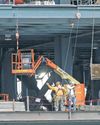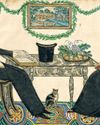CATEGORIES
Categories

Ukrainian Ex-POWs Survived Torture at Hands of Russians
Twenty-six Ukrainian prisoners of war sat naked on a cold stone floor, their legs crossed, heads bowed and hands clasped behind their backs.

Meme Coins Like Trump's Stir Wild Market
Just days ahead of his return to the White House, President Trump and his wife, Melania, launched a pair of meme coins that have skyrocketed in value and earned them billions of dollars, at least on paper.

Prince Harry Settles U.K. Tabloid Suit
Murdoch's papers apologize for privacy intrusions on Duke and Princess Diana

NOW YOU SEE HER
Bertha Russell would be so disappointed. When Carrie Coon, who plays the calculating social climber on The Gilded Age, sits down at the Regency Bar & Grill, just a few blocks and about 140 years from the fictional mansion where her character resides, it's the tail end of the restaurant's infamous power breakfast—a crucial error in timing for anyone hoping to rub elbows with New York City's ruling class.

The Sacredness of Human Development
CHRISTIANNA DEICHMANN is the Director of Education at the Association for Prenatal and Perinatal Psychology and Health (APPPAH), where she educates both professionals and parents on fostering the most nurturing environments for welcoming new life into the world. She is based in Charlottesville, Virginia, USA. With a multidisciplinary approach, Christianna blends Craniosacral Therapy, massage, and pre- and perinatal psychology into her holistic practice. Her work uniquely combines science and spirituality.In part 2 of this interview, Christianna continues to shares her expertise with DR. SNEHAL DESHPANDE, a Developmental Therapist, PPNE, and the Director of Heartfulness Family Connect Programs, offering a rich dialogue on Birth Trauma and Obstetrical Intervention.

Not Just Homes, but Also Many Workplaces, Have Vanished
LOS ANGELES-Antonieta Lopez knew each feature and quirk of the stately, East Coast-style home on Villa View Drive.

New Wildfire Spreads Quickly In L.A. County
Hughes fire scorches thousands of acres north of Santa Clarita, forces evacuations

ONCE UPON A Saturday
SULOCHANA SANTHOSH is a young and inspired writer who reminds us of the need to care for our ocean and the environment in general. What are you doing to make a difference?

Musk Criticizes AI Project Backed By Trump
President's close ally raises questions on funding, spars online with OpenAI chief

The Secret Service and the President's Life
The week Donald Trump won re-election, the Justice Department warned about continued assassination plots against elected officials, this time from Iran.

The Devil's Tree
DR V. RAMAKANTHA, retired forest officer, who lived, raised a family, and worked in forests for most of his adult life, returns to our pages in 2025 to share his vast knowledge of medicinal plants, and the fascinating stories associated with them. In his signature style, this month he weaves together science, folklore, and traditional knowledge to tell the story of the Devil's Tree, Saptaparni.

Seven of Us
is a lecturer at the Bangkok School of Management, a wellness coach, and the co-leader of the Bangkok Women's Writers Group. Here, Bhavna writes about her inspiring experience of cleaning up the garbage in the city that is her home.

Drug Violence Surges in Colombia
The war over cocaine between armed groups in northeastern Colombia has killed about 80 people in recent days and forced tens of thousands to flee their homes, signaling a likely end to President Gustavo Petro's plans to sign peace accords with drug-trafficking groups.

Rising Corn Prices Offer Growers Hope
However, Trump's tariffs could quickly halt gains and demand for the grain

Netflix Explodes Into a New Era
Streamer unveils blowout subscriber numbers and price increase, but record value sets a high bar

Children Who Need Parents
The Sun Won't Come Out Tomorrow

The Most Valuable Program In College Football Is Ohio State
OHIO STATE just won the right to call itself college football's national champions by stomping Notre Dame. But even before they took down the Fighting Irish, the Buckeyes had already earned an even more lucrative title.

How Young Is Too Young to Start an Art Collection?
It will take more than just a trust fund to get them to sell you that painting.

Baby-Boomer Women Power Wealth Transfer
They now have the final say on how family nest eggs get parceled out

Give Me Liberty!
Creative freedom, it turns out, is a very wise investment.

WHERE THE WILDLY EXPENSIVE THINGS ARE
In a small city in the Dutch hinterlands, sharp-elbowed dealers hunt the biggest game of all: billionaire collectors voracious for treasures from the last art fair that truly matters.

UNLEASHING OUR Extraordinary Capabilities
LYNNE McTAGGART is one of the central authorities on the new science of consciousness, and the award-winning author of seven books, including the internationally bestselling The Intention Experiment, The Field, The Bond, and The Power of Eight. Here, Lynne is interviewed by PURNIMA RAMAKRISHNAN about the transformative power of intention, the profound impact of group intention, and the potential for individuals to create significant change in their lives and the world.

Five Things to Know About The Latest Orders on Energy
President Trump signed a salvo of executive actions this week aimed at unleashing America's energy resources and fulfilling his campaign promise to make oil and gas a pillar of U.S. prosperity and global dominance.

Electronic Arts Lowers Its Outlook
Electronic Arts cut its outlook, citing less engagement across its soccer-themed videogame titles.

The Joy of Unity
SARAVANAN SUBRAMANIAM, Director of HeartyCulture Natural Products, India, introduces us to a new type of grafted mango at the nursery in Kanha Shanti Vanam. Not only does this new variety bring diversity to our taste buds, but also symbolizes the unity in diversity we all wish for in ecosystems that include human beings.

President Begins to Dismantle And Reshape Federal Workforce
President Trump's pledge to upend the federal workforce began rippling through Washington after he moved to force government employees back to the office five days a week, weakened their job protections and froze diversity efforts across the government.

State Eyes Reboot Of Nuclear Plant to Power AI
Santee Cooper, the big power provider in South Carolina, has tapped financial advisers to look for buyers that can restart construction on a pair of nuclear reactors that were mothballed years ago.

IRS Cracks Down on Money You Earn Online
The Internal Revenue Service may know a lot more about your side hustle this tax season. And the agency is cracking down on those who fail to report the added income.

The Star Being Kept Out of Cooperstown
Ichiro Suzuki, CC Sabathia and Billy Wagner were voted into baseball's Hall of Fame, while Carlos Beltrán fell short again after his role in the 2017 Houston Astros sign-stealing scandal

The Asphalt Jungle's Animals
A show traces the history of New Yorkers and their beloved pets.